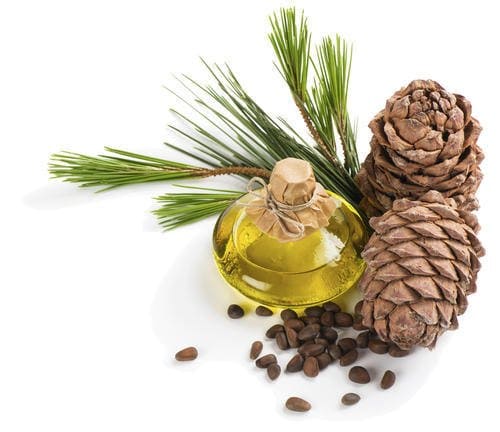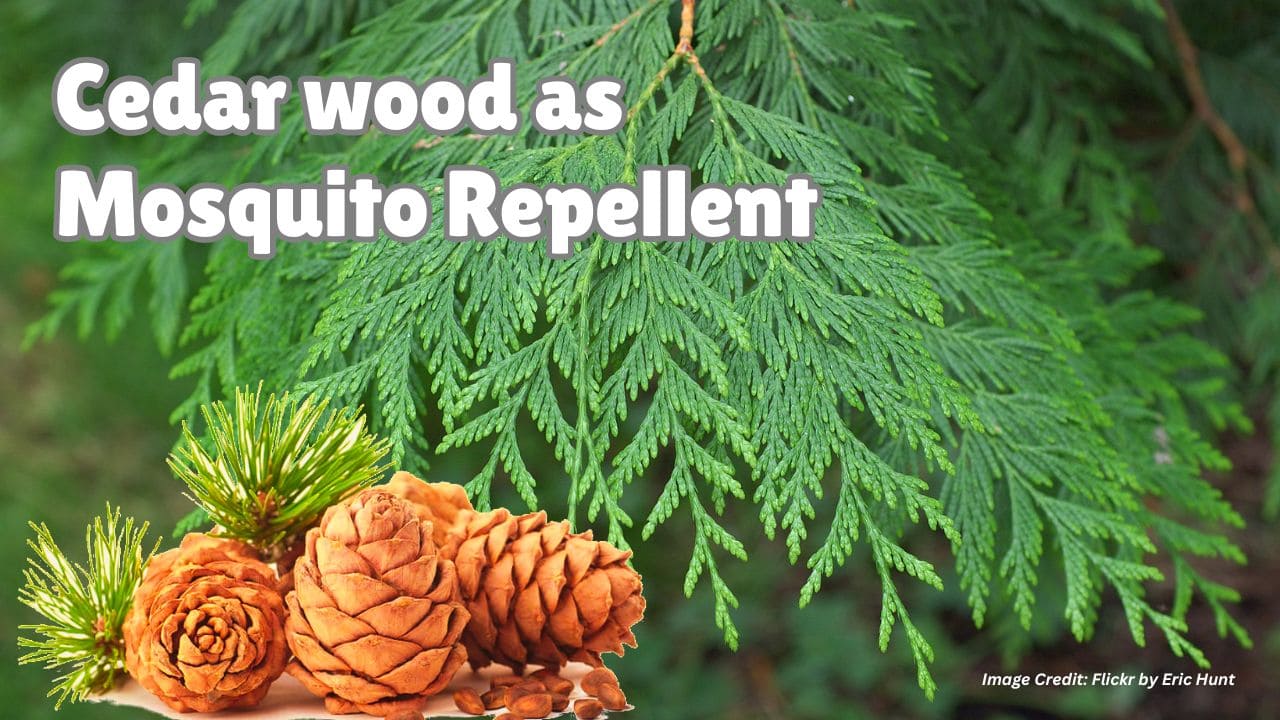Table of Contents
Does Cedarwood repel mosquitoes?
Yes, cedarwood has been in use as a mosquito repellent since many years. The cedarwood oil contains active compounds like cedrol and thujopsene, which are very effective in repelling mosquitoes. Apart from masking the scents that humans release, they also disturbs the neurological pathways causing disorientation in mosquitoes. Thus, mosquitoes fail to locate their hosts. Cedarwood is an effective natural and eco friendly alternative for repelling mosquitoes.
What is Cedarwood?
Cedarwood is a kind of tree from the cypress family, particularly in the genera Cedrus, Juniperus, and Thuja. Cedarwood has been used in construction, furniture making and as an insect repellent, since centuries. While the oil extracted from it has been widely in use – for aromatherapy, perfumery, and natural remedies, because of its soothing scent and therapeutic properties.

Image Credit: Indiamart.com
Different types of Cedarwood
1. Eastern Red Cedar
- Found in North America
- known for its reddish colored wood
- Used for making cedar chest and in closet linings
- Its oil contains compounds that has insect repelling properties
2. Western Red Cedar
- This also found in North America, particularly Pacific Northwest
- It has specific aromatic odor
- Strong enough and has got good resistance to decay
- Used in making outdoor furniture and setups
3. Atlas Cedar
- Found in North Africa in Atlas Mountains
- Its wood and oil both has strong fragrance
- Used specially in aromatherapy and perfumery
4. Himalayan Cedar
- Found in the Himalayas
- It has a soothing fragrance and therapeutic properties
- Used traditionally in natural medicines and religious rituals and ceremonies.
- Also has got mosquito repelling properties
How Cedarwood repel mosquitoes?
Cedar wood has specific compounds, cedrol and thujopsene, which are responsible for its mosquito repelling action. These active compounds masks the scents of carbon dioxide and other emissions from human bodies, and interferes with their olfactory senses, because of which they are unable to locate their hosts. As this strong aromatic odor is unpleasant for mosquitoes, they leave the area.
Also, these compounds causes disorientation in many insects because of neurological interference, which results into their death
Different forms of Cedarwood mosquito repellents
Cedarwood mosquito repellents are available in various forms, and can be used as per the requirement:
- Cedarwood Essential oil
- Cedarwood mosquito repellent spray
- Cedarwood chips and mulch
- Cedarwood incense and candles
Methods to use Cedarwood as mosquito repellent
1. Direct application on skin
- Mix few drops of cedar wood essential oil with any carrier oil like coconut or olive oil.
- Apply the mixture as a lotion on your skin before going to outdoors.
- Reapply if needed, for prolonged protection from mosquitoes.
2. Cedarwood mosquito repellent spray
- Mix some cedar wood essential oil with water and small, and add small amount of spirit or alcohol like witch hazel which helps in mixing it with water.
- Transfer it into a spray bottle.
- Shake well before use.
- Spray around the room, corners, entry points, windows, on your clothing, etc.
3. Cedarwood chips and mulch
- Cedarwood chips can be spread in outdoor locations, in garden or lawn near sitting areas.
- The cedarwood mulch will keep away other insects as well, including ants, termites, etc.
4. Cedarwood incense and candles
- Cedarwood incense and candles are very effective mosquito repellents that slowly and gradually spreads throughout the room, with a very mild fragrance.
- It creates a very pleasant ambience and atmosphere either inside a home or outdoors.
- Very much useful for keeping mosquitoes away while you are having quality time with your friends and family in garden or lawn.
DIY Cedar mosquito repellent recipes
1. Cedarwood and Lemon Eucalyptus repellent
Ingredients:
- 10 drops of cedarwood oil
- 10 drops of lemon eucalyptus oil
- 2 tablespoons of spirit or alcohol like witch hazel
- 1/4 cup of water
Mix all contents together and transfer in a spray bottle. Shake well before using.
2. Cedarwood and Lavender oil mosquito repellent
Ingredients:
- 10 drops of cedarwood oil
- 10 drops of lavender oil
- 2 tablespoons of coconut oil
Mix all the contents together to get a lotion, which you can apply directly on skin.

Image Credit: Pexels by Yan Krukau | Content License
Advantages and disadvantages of cedar wood mosquito repellent
| Advantages | Disadvantages |
|---|---|
| Natural, Non-toxic and eco-friendly | Not completely reliable in areas with high mosquito population |
| Pleasant aroma with improved surrounding ambience | May cause potential allergic reactions in some individuals |
| Can be used in different forms like essential oil, spray, lotion, chips, mulch, etc. | Need to reapply frequently, due to low efficiency |
| Can be used against other insects as well |
Frequently Asked Questions (FAQs)
-
What does cedar wood repel?
Cedar wood repel many anthropods like moths, termites, ants, mosquitoes, etc. with its aroma that is unpleasant for insects. Cedrol and thujopsene are two important compounds that are found in cedar, which have insect repelling properties. Its use as insect repellent is known since centuries and therefore people mostly use cedar chest made of cedar wood to store their clothing.
-
What does cedar smell like?
Cedar has a pleasant mild earthy smell, which most of the insects dislike and stay away. The other forms of cedar that are used in fragrances are more woody and often paired with citrus, floral and balsamic undertones. Fresh cedar wood will smell with an aromatic camphorous odor.
-
What bugs hate cedarwood?
Moths, mosquitoes, woodworms, termites, ants, roaches, ticks, flies, fleas, bed bugs, even snakes and rodents like rats and mice hate cedarwood.
-
Is cedar a good insect repellent?
Cedar repel most of the insects because of its unique aromatic earthy smell. But there are instances where its efficiency is not sufficient specially in locations where there is higher population of mosquitoes or any other insects.
-
Is cedarwood an insecticide?
Not in general, it has got insect repelling properties due to its woody earthy smell, which most of the insects don’t like at all. While the cedar wood essential oil causes neurological interferences in some insects that may lead to death.

